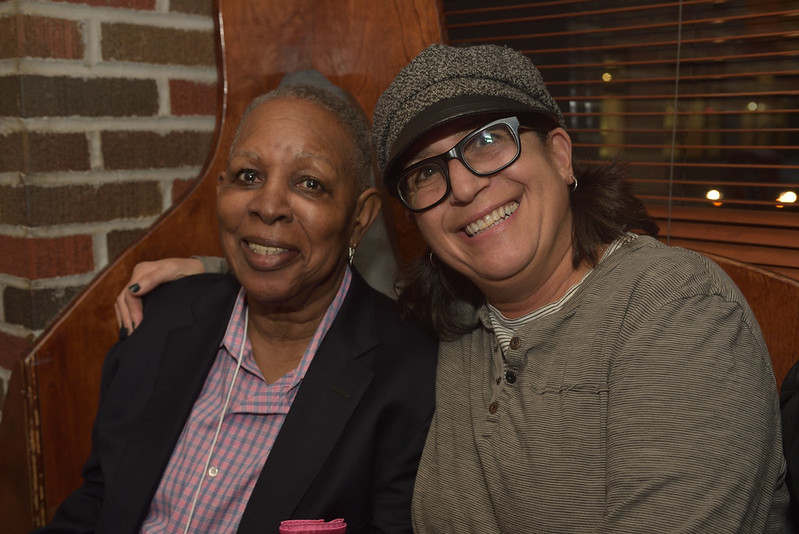Can you imagine not having access to your loved one enduring a lengthy hospital stay?
Can you imagine being strategically left out of the end of life decisions for your partner or significant other?
Do you have the legal standing necessary to handle your partner or chosen family member’s affairs?

Participants at SAGE’s 2019 Women’s Dance at Henrietta Hudson, New York City. (Photo courtesy of SAGE.)
A family of choice is a phrase used with pride to describe the close-knit relationships and adopted kin networks for LGBTQ+ populations. The presence of a secure and functional support network is one of the most vital components of healthy adjustments and optimal functioning for LGBTQ+ aging populations (SAGE, 2014).
Our nation’s population is aging, with the baby boomers entering retirement and adjusting to empty nests and finding new ways to connect through social media and social groups. Most older adults have a strong desire to age in place in the home they created with their loved ones. The alternative is aging in an assisted living facility or nursing home away from loved ones and community. For this reason, the attention to physical and mental health is being highlighted throughout communities to encourage harmonious aging for populations across the country.
Physical and mental health during normative aging into retirement is influenced by access to positive community connections and regular activity. However, regular visits with family of kin is more likely to be experienced by heterosexual older adults than sexual minority older adults (Wilkens, 2015). This lack of immediate family support often increases loneliness and potential depression among LGBTQ+ older adults, who are more likely to be single, live alone, and be childless than heterosexuals (Fredriksen-Goldsen et al., 2013; Woody, 2014). The closeness of chosen family is life-changing for the physical and mental health of those with limited family support. Often, older adults rely on chosen family to assist with doctor visits, homecare, financial management and much more.
However, the support of valuable chosen family could be hindered by legal obstacles and biological family members who do not acknowledge the relationship or support provided (Brennan-Ing, Seidel, Larson, & Karpiak, 2014). Knauer’s (2016, p. 159) research stated that the chosen family lacked legal recognition in the absence of planning documents. Without legal standing to consent to or refuse medical treatment or make other decisions on behalf of their chosen family member, it remained likely that chosen family would be considered mere legal strangers. Approximately 11% of sexual minority elder care was provided by the family of kin; leaving most of the caregiving for the spouse, partners or other families of choice (Knauer, 2016).
Now is the time to prepare for the aging needs that impact the wellness and harmonious living of our LGBTQ+ older adults. They value the care received from each other in the absence of adult children and those with an obligation of family duty (Black & Dobbs, 2014). Make the decision today to have the conversations. Seek the resources you need to prepare your documentation. Talk with your family of kin and have a clear conversation about your wishes. Embrace each other and continue to support your chosen family.
References:
Black, K., & Dobbs, D. (2014). Community-dwelling older adults’ perceptions of dignity: Core meanings, challenges, supports and opportunities. Ageing & Society, 34(8), 1292-1313. doi:10.1017/S0144686X13000020
Knauer, N. J. (2016). LGBT older adults, chosen family, and caregiving. The Journal of Law and Religion, 31(2), 150-168. doi:10.1017/jlr.2016.23
Brennan-Ing, M., Seidel, L., Larson, B., & Karpiak, S. E. (2014). Social care networks and older LGBT adults: Challenges for the future. Journal of Homosexuality, 61(1), 21-52. doi:10.1080/00918369.2013.835235
Fredriksen-Goldsen, K. I., Kim, H., Barkan, S. E., Muraco, A., & Hoy-Ellis, C. P. (2013). Health disparities among lesbian, gay, and bisexual older adults: Results from a population based study. American Journal of Public Health, 103(10), 1802-1809. doi:10.2105/AJPH.2012.301110
SAGE. (2014). Out & Visible: The experiences and attitudes of LGBT older adults, Ages 45-75. New York.
Wilkens, J. (2015). Loneliness and belongingness in older lesbians: The role of social groups as “community”. Journal of Lesbian Studies, 19(1), 90-101. doi:10.1080/10894160.2015.960295
Woody, I. (2014). Aging out: A qualitative exploration of ageism and heterosexism among aging African American lesbians and gay men. Journal of Homosexuality, 61(1), 145-165. doi:10.1080/00918369.2013.835603
The opinions expressed in this article are those of the author and do not necessarily reflect those of the Diverse Elders Coalition.
